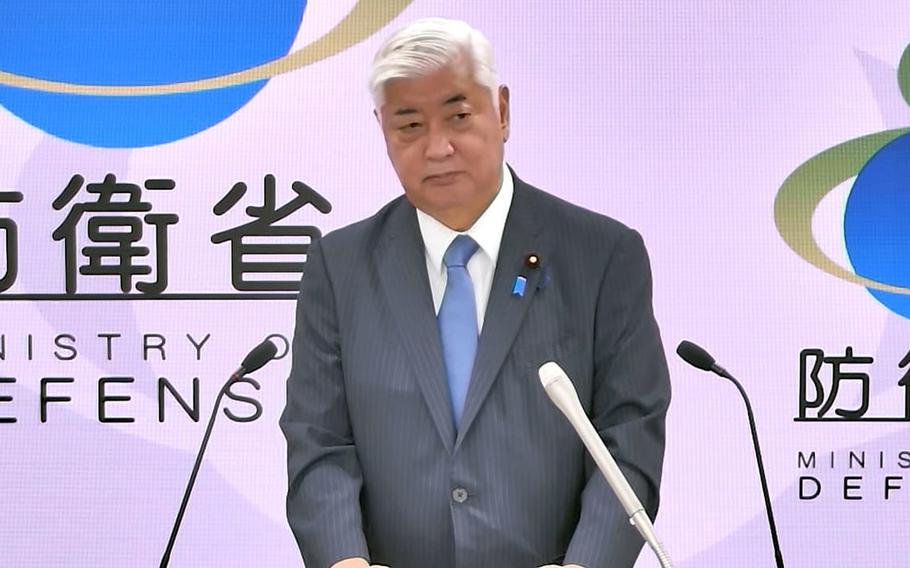
Japanese Defense Minister Gen Nakatani speaks during a televised press conference in Tokyo on July 29, 2025. (Japan Ministry of Defense)
TOKYO — Japan’s defense minister has dismissed as “completely unfounded” a report that the nation’s military urged the United States to threaten nuclear retaliation against China during a tabletop exercise last year.
Kyodo News, citing unnamed government sources, reported Sunday that the Japan Self-Defense Forces “strongly urged” the U.S. to consider theoretical nuclear threats during Keen Edge drills in February 2024.
The scenario involved China hinting at the use of nuclear weapons in a regional conflict, according to the report. In response, Japanese officials reportedly encouraged U.S. participants to consider threatening a nuclear response.
Kyodo reported that the U.S. ultimately agreed, though no nuclear weapons were used in the scenario.
Defense Minister Gen Nakatani denied the report at a news conference Tuesday, saying no such exchanges took place during the exercise.
A ministry spokesperson called the report “groundless,” in an email to Stars and Stripes on Tuesday. He said Keen Edge focused solely on the defense of Japan and did not specify a region or identify a particular country as an adversary.
Japanese government spokespeople typically speak to the media on condition of anonymity.
Japan and the U.S. have discussed scenarios involving the potential use of nuclear weapons as part of extended deterrence talks, Kyodo reported in a separate article Sunday that also cited unnamed sources.
For the first time, the two allies examined the possible consequences of nuclear weapons use, including how to manage public opinion, according to that report.
Nakatani did not address those discussions and was not asked about them during Tuesday’s news conference.
Chief Cabinet Secretary Yoshimasa Hayashi said Monday that Japan “intends to communicate closely with the U.S. government and further strengthen the credibility of U.S. extended deterrence, including nuclear deterrence,” according to video of his remarks posted on the Defense Ministry’s website.
U.S. Forces Japan is “unable to disclose details about the exercise and its scenario” due to security concerns, Air Force Maj. Allison Trueblood, a command spokeswoman, said by email Wednesday.
Japan — the only nation to have suffered nuclear attacks — remains committed to a world without nuclear weapons, Nakatani said. He reiterated Tokyo’s adherence to the Nuclear Non-Proliferation Treaty and a “realistic and practical approach” toward nuclear disarmament.
The U.S. dropped atomic bombs on Hiroshima on Aug. 6, 1945, and on Nagasaki three days later. This year marks the 80th anniversary of those attacks, and nuclear weapons remain a politically and emotionally charged issue in Japan.
Japan neither possesses nor seeks to acquire nuclear weapons and prohibits their storage or transport within its border, said Benjamin Blandin, a research fellow at the Yokosuka Council on Asia-Pacific Studies.
Japan has never formally requested to be included under the U.S. nuclear umbrella, though it is widely regarded as being covered by it, he said by email Monday.
“In case of a total war between the U.S. and China, where either or both would exchange nuclear strikes, I believe that Japan would apply a strict self-defense policy,” Blandin wrote.
The same could be said for any potential conflict involving China and any of its neighbors, he added.
Any discussion between Japan and the U.S. about nuclear weapons likely centers on nuclear proliferation in the region, said Stephen Nagy, a professor of international studies at International Christian University in Tokyo.
“[North Korea] and China continue to expand their arsenals, and [South Korea] is having very active discussions about the acquisition of a nuclear deterrent,” he said by email Monday.